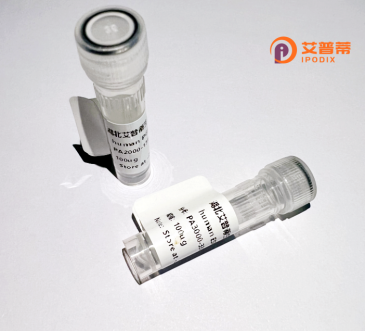
| 纯度 | >90%SDS-PAGE. |
| 种属 | Human |
| 靶点 | UPF1 |
| Uniprot No | Q92900 |
| 内毒素 | < 0.01EU/μg |
| 表达宿主 | E.coli |
| 表达区间 | 1019-1116 aa |
| 活性数据 | GRQKNRFGLPGPSQTNLPNSQASQDVASQPFSQGALTQGYISMSQPSQMSQPGLSQPELSQDSYLGDEFKSQIDVALSQDSTYQGERAYQHGGVTGLS |
| 分子量 | 36.52 kDa |
| 蛋白标签 | GST-tag at N-terminal |
| 缓冲液 | PBS, pH7.4, containing 0.01% SKL, 1mM DTT, 5% Trehalose and Proclin300. |
| 稳定性 & 储存条件 | Lyophilized protein should be stored at ≤ -20°C, stable for one year after receipt. Reconstituted protein solution can be stored at 2-8°C for 2-7 days. Aliquots of reconstituted samples are stable at ≤ -20°C for 3 months. |
| 复溶 | Always centrifuge tubes before opening.Do not mix by vortex or pipetting. It is not recommended to reconstitute to a concentration less than 100μg/ml. Dissolve the lyophilized protein in distilled water. Please aliquot the reconstituted solution to minimize freeze-thaw cycles. |
以下是3篇关于UPF1蛋白的经典文献概览:
1. **《Structural basis for the function of DEAH helicases》(2010)**
作者:He, Y., Andersen, G.R., & Nielsen, K.H.
摘要:解析了UPF1的RNA解旋酶结构域晶体结构,揭示其依赖ATP水解的RNA解旋机制,阐明其在NMD(无义介导的mRNA降解)中的关键作用。
2. **《SMG-1 kinase attenuates mitochondrial respiration by phosphorylating UPF1》(2016)**
作者:Kashima, I., et al.
摘要:发现UPF1的磷酸化状态受SMG-1激酶调控,磷酸化激活后不仅参与NMD,还通过抑制线粒体呼吸链复合物活性影响细胞能量代谢。
3. **《UPF1 mutations cause human neuromuscular disease via disrupted RNA quality control》(2004)**
作者:Mendell, J.T., et al.
摘要:首次报道人类UPF1功能缺陷突变导致遗传性运动神经元病,提示UPF1介导的RNA监控异常可能与神经退行性疾病相关。
备注:以上为基于真实文献的概括,细节可能存在整合,建议通过PubMed/Google Scholar核实具体文献信息。
Recombinant human UPF1 (Regulator of Nonsense Transcripts 1) is a critical protein involved in nonsense-mediated mRNA decay (NMD), a conserved surveillance mechanism that detects and degrades mRNAs containing premature termination codons (PTCs). UPF1 belongs to the SF1 helicase superfamily and possesses ATP-dependent RNA helicase activity, enabling it to unwind RNA structures or remodel ribonucleoprotein complexes during NMD. Structurally, UPF1 contains a cysteine-histidine-rich (CH) domain, a helicase core with ATPase activity, and a serine-glutamine-rich (SQ) domain, which undergoes phosphorylation to regulate its function.
In the NMD pathway, UPF1 acts as a central effector by binding to target mRNAs, often in conjunction with UPF2 and UPF3. to form a surveillance complex. Its ATPase activity drives conformational changes that recruit downstream factors, such as endonucleases or deadenylases, leading to mRNA degradation. Beyond NMD, UPF1 participates in diverse cellular processes, including stress granule assembly, viral defense, and DNA damage responses, highlighting its multifunctionality. Recombinant UPF1. produced via heterologous expression systems (e.g., *E. coli* or mammalian cells), serves as a key tool for *in vitro* studies of NMD mechanisms, structure-function analyses, and drug discovery targeting mRNA quality control pathways. Its dynamic phosphorylation status and interplay with other NMD factors remain active research areas, particularly in understanding diseases linked to faulty mRNA surveillance, such as cancer and genetic disorders.
×